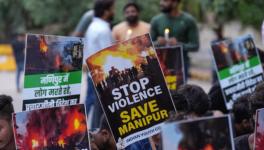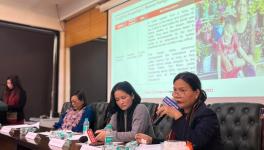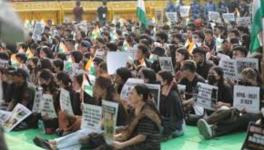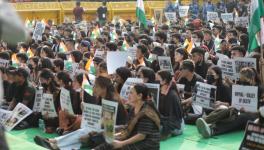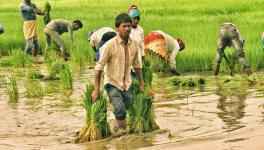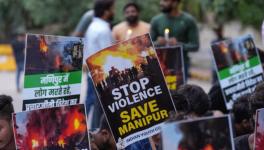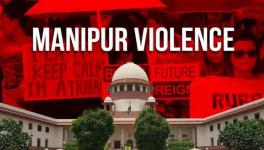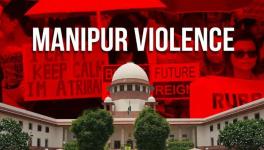Manipur Needs Politics That Unites: Nandita Haksar
For the past few days, violence in the state of Manipur has escalated between the various communities that live there. The immediate trigger for the violence is understood to be a ruling by a court, which says the state government should consider the demand of the Meiteis, which is the dominant community in the state, for scheduled tribe status. However, this is a demand, which has been opposed by the hill residents of the state of Manipur. While this is the immediate trigger, there is a long history of conflict and disagreements between the communities in Manipur. To discuss what these are and also how to emerge out of the current spiral of violence and find longer-lasting solutions for the conflicts, NewsClick speaks Nandita Haksar, a human rights lawyer, who has extensively travelled in and written about the Northeast, including Manipur. Edited transcript of the video interview:
Pragya Singh: Whenever there is violence the question arises, why? Why are people so angry? Can you give us a sort of look into the background of what is happening in Manipur right now between the Meitis, the Kukis, and other communities?
Nandita Haksar: I am glad you asked what is the background, because however horrendous the violence, and it has been horrendous, and the attacks on Kukis both in Manipur, Shillong and Delhi by the Meiteis is something which obviously anyone would condemn. I believe actually most Meiteis also would condemn this because I don't think they support it. I don't think the anger of the Kukis also (is extreme); if you see the women, Kuki women are supporting or protecting Meiteis. So this anger is there, it's real and it's brutal. Yes, it has been condemned by everyone, and yes, there are calls for peace by people like Mary Kom and others. But as you said we should go behind this because this happens again and again and then the country forgets the volatile situation of Manipur.
So, let us look at it in its historical context. Manipur has from time to time been declared the most dangerous state in the country. It has a volatile situation. There have been a lot of clashes between Nagas and Kukis, between Meitei Hindus and Meitei Muslims, or conflicts between Tamils and others, and various communities at various times.
There is always some specific reason why a particular kind of violence like this breaks out. But behind all these, I think, are two reasons. One is the issue of land. There is tremendous pressure on land in Manipur as in other parts of the country. This pressure of land has been interpreted in various ways. For instance, the Meiteis’ demand for ST (Scheduled Tribe) status, which seems very absurd to the tribals, as they have always looked down on tribals.
Now, why are they demanding it? Because they feel their land is being taken away for various reasons, which we will come to, and they say they want to settle in the hills. But I don't think that really is the issue. The Meiteis, Naga, Kukis, Pangals, all of them can come to some kind of resolution. But why are they not able to?
There are three or four reasons. The immediate reason, as on February 21 and earlier also, has been the situation in Myanmar. Because of the situation in Myanmar after the army rule, hundreds and thousands of people are fleeing from the area. After the coup, there have been bombings. In fact, one bomb actually fell into Mizoram.
So, this influx of people, they are refugees, and India has decided that there are no refugees, or rather the Indian government has decided through an executive order that there are no refugees in India; they are all illegal migrants. So, these people are all on the borders and the greatest pressure is on the Kuki people, because they [the refugees] are coming to Churachandpur, they are coming to More, and the Kukis have had to bear the brunt of this influx because they are part of the same family of tribes. They have been very generous. They have raised money. The churches have accommodated these refugees, given them shelter, solace, and protected them from illegal arrests. The whole burden has been on them.
PS: Why then does it seem that Meitei are a little more upset than the Kukis? Why is it also a demand of the Meitei which has led to Kuki anger against them?
NH: Correct. So, now the Meitei's feel that all these people who are coming in, and some of them have come in, are going to settle on their lands in the valleys and they [the refugees] will take away their [Metei’s] land. I don't know exactly the figure, but let me quote some figures for you.
One of the allegations is that there are more than 966 new villages. So, there are 308 new villages at Kangpokpi, 281 new villages in Churachandpur, 205 in Chandel. Now, what are these figures? These are illegal villages. These are non-recognised villages. These villages are asking to be recognised. Some of them, perhaps a majority of them, are of this influx of (Chins) refugees coming to India, and if they are in villages, that means they are permanent settlers.
So, the question is how do we deal with this huge humanitarian crisis? And if the government says we have nothing to do with them as they are illegal migrants and wash its hands off, then the crisis increases. Some of them wanted to come to Delhi to get UNHCR support or to get to their own people; the Chins are here in Vikaspuri [Delhi] and other places. They were arrested because they don't have cards and they can't even get Aadhaar cards. I'm not sure of the figures today, but 200-300 people were arrested, and are in jails. There was a situation in which some of these people, I know of four, and at least two of them were women who died of COVID-19 in the jail, and the court did not give order to let them go to the hospital.
So, this tremendous pressure on land is coming, plus there are other long-term factors such as climate change. These are all factors which are going to put pressure on land and urbanisation.
PS: Is it correct that these villages are coming up mostly in the areas where the Meiteis do not live in large numbers?
NH: As I said, there are 308 new villages in Kangkokpi, 281 in Churachandpur, all of them are in tribal areas. So, this is a very complex issue of land. I said there are two reasons, one is the land issue; let me relate one more issue, which added to the anger of the Kukis – it was the growth of poppy cultivation. Now this growth of poppy cultivation means that Manipur, which used to be a place for trafficking of drugs, is now becoming a hub for production of drugs.
PS: That is a very significant shift from how it was before.
NH: Absolutely, and at least some figures that I've got is that between 2017 and 2021, 14,305 acres of illicit poppy were destroyed by the police. It is huge. Behind this, I'm told by a source who is in intelligence, that some intelligence agencies are behind [this]; who they are, what they are, has not come out, and it's a matter of investigation why this sudden growth of poppy cultivation. And, if you suddenly evict people or destroy it, you're destroying their means of livelihood at the very moment when there's pressure from the migrants or people fleeing from a brutal army rule and coming into India.
Now Mizoram has managed to deal with it. And if Mizoram can deal with it… they have got dormitories, very basic dormitories made of bamboo and are giving basic food, at least they have done that. So, Manipur should be able to deal with this [the influx of people].
I do not think we want to call the army in and call for the National Register of Citizens and do all those things which lead to vast human rights violations and misery. But we do need to give identity cards to these people and have a way of dealing with them in a humanitarian manner.
So, I think this would be the solution rather than blaming them, putting all this pressure on the Kukis and instigating this violence. For the first time, there has been ethnic violence. But it is now looking more and more like religious violence.
PS: Is it looking at religious violence, because the Delhi media is reporting it that way?
NH: Because there have been attacks on churches, and this is a direct result of BJP’s policies. I do not wish to say that nothing would have happened under the Congress. Congress also did nothing [about the existing issues]. But with the BJP's intense Hinduisation programme or emphasis on Hindu extremism or Hindu nationalism, they are looking upon anti-Christian attacks in other parts as well. So, churches have been burnt. So, every variety of identity politics – for instance between Catholics and Baptist churches, Muslims versus Hindus, Christians versus Meiteis – is tearing the fabric of Manipur apart.
Therefore, the call to peace is one thing… Maybe everyone will stop killing each other. But the hatred, the suspicion and the bad blood and the problems will remain. So, what is the solution? And I do not know 'the' solution, but I would like to say that this identity politics must stop.
PS: The Méiteis seem to have identified ST status as the answer to many of their problems. Is that going to feed into identity politics and conflicts?
NH: Yes, of course. It’s really sad. I look at it as sad because the Meiteis were very proud of the fact that they are not tribals, that they are an ancient civilisation - which they are. They have a written script, they have poetry, they have an old religion, and suddenly this demand that they want to have tribal status. Why? Because they think that they will get land in the tribal areas.
But, in fact, what will happen is when everyone has tribal status, nobody will have it, and the land will not be protected. And who will take the land? Neither the Nagas nor the Kukis nor the Meiteis, but some multinational companies. For instance, in Kashmir, who got the contract for land for shopping malls? It was the Emirates.
So, the people of Northeast, all of them -- Naga, Kuki, Méitei, Pangal and anyone else living there will lose, and are already losing, their land. So, this is not a solution.
The only solution for the people of Manipur and all, including Marwaris – they have been living there for years and years – everyone must come together, stop identity politics, and at least talk in terms of Manipur. If we like Manipur, if we love Manipur, then there must be a way of solving this problem.
PS: You mean socio-economically rather than…?
NH: No, politically! Because politically we have to come together. Socially, economically, yes we may belong to a tribe, we have some allegiances, socio-economic connections, but there must be politics which unites people. Identity politics has been dividing, continuously becoming worse and worse, and this will not stop. It dehumanises because it makes everyone else the ‘other’. For Meiteis, Kukis and Nagas are the other, for the Nagas, Kukis are the other, for the Pangals, everyone is the other.
So, you have a situation which is volatile, and it's on the border. We have the Burma [Myanmar] border, we have China nearby, we have Bangladesh. It is not a situation that is good for our country. And, in India, neither the media nor the people, nor MPs, nor political parties are engaged with these issues or informed about these issues.
PS: Are you seeing the kind of response, even statements like - let's have peace - come from the ruling party?
NH: Well, let's forget the ruling party just now, because I don't have a beef with any of these parties, as I don't think they really react. But I do see one, and I don't want to name it on this programme, but one of the top media people, a specialist in Northeast, got all the facts wrong. He thought Kukis were attacking Meiteis and he went on national media.
PS: There are others who are saying this, too.
NH: Yes, but that particular person is a very senior journalist. So, if you don't even get the facts right, you misinform the public. As it is, it's a very complex issue. Then, if we are talking about India, and I am talking about India, it's always about India, then this identity politics is a virus which is going to go all over. It's not going to be [stopped] and it's linked to a government which is promoting a certain identity for the country. So, this is not good for the future of India.
PS: Are you trying to caution that the identity politics played today in Manipur might actually add more to this sort of violence?
NH: Of course, then it will become a Christian issue, then it will become Muslim issue, it will become Hindu issue, and the identities will spill over Manipur. So, instead of containing it and having a Manipur politics, a political solution… but I would like to say one other thing – all this violence plus the identity politics is exasperated by the fact that every community has an armed group supporting its demands. Every community. The Nagas have NSCN, but they also have other Naga armed groups, and local armed groups also; Kukis have many, many groups, Meiteis have.
So, this kind of violence and these political armed groups have no politics left. They do not have politics except very narrow identity politics, and it is also true that they are the only ones who can protect their own people. Because in this kind of situation, they did come in and they did protect the Kukis. But where is it going? For whom is it going? And that's why someone has to stop it and someone has to appear from Manipur itself with a political vision.
PS: What would the contours of such a political vision be? How would we distinguish it from an economic vision – a vision that gets jobs, a vision that makes land the issue?
NH: All these issues would be from politics because if you want a vision of this state then you have to acknowledge the fact that the tribals of Manipur have been deprived of their share of development. Tribal funds have been used by Meiteis, and they are very good figures, which I don't think in this programme we can go into, but I have the figures, which were given in fact by a Congress MP in the Legislative Assembly. Alfred Arthur gave these figures about the disparity between tribals and Meiteis. So, these things have to be acknowledged.
PS: What do you mean by ‘being acknowledged’?
NH: Acknowledged by the communities, because when, for instance, I would like to say at this point I am an Indian. It took a long time for me to feel at home with the Nagas, always saying Nagas and Indians. It used to really upset me, and it took a long time for me to see that our army is actually attacking Nagas and it was not very easy to take up a case in the Supreme Court representing Nagas against Indians. But I had to acknowledge it because if we are wrong, we are wrong and whoever is wrong has to acknowledge it. So, it is now maybe like a truth and reconciliation situation, maybe because there are a lot of Christians, maybe we can have a truth and reconciliation commission. But I don't know. The people in Manipur will have to decide, because nobody else is going to. Nobody else has the vision, nobody else has the interest.
PS: So, you mean that politics should facilitate communities to actually talk to each other rather than look at a court order or an executive order? You do not think that the deployment of armed forces would be a permanent or a long-lasting solution?
NH: Of course not. We fought and we fought very hard to get rid of their rifles. So, the people of Manipur fight. So did the Meiteis fight. And it has been a long time since they had sort of ‘shoot-at-sight’ orders…. We are calling for the army back. We are calling for the Centre to interfere. The Centre has never done anything. They are not going to find a solution. It is the people of Manipur, all the communities have to come together not only to talk about peace but hard issues.
And in Manipur, if anyone talks or criticises, they are shot. They are scared of being killed. I have faced it myself… At some other point of history when I spoke on the issues. So, these are issues I really care about. I care about my country of course, but I care about Manipur. And I think that all of them are rational enough to sit together, and maybe a truth commission – you know like they had in South Africa – can work where they can face all this. Because of its long-run history of mutual suspicions and historical conflicts.
PS: Do you think that the governments at the Centre and the state are really in a position to be able to mediate such an arrangement?
NK: No, never. Not with the BJP government which has been responsible for some of this. Never has this Hindu-Christian issue come up. The churches are being burnt, and why? Because there is a kind of atmosphere in which such things can be done.
Get the latest reports & analysis with people's perspective on Protests, movements & deep analytical videos, discussions of the current affairs in your Telegram app. Subscribe to NewsClick's Telegram channel & get Real-Time updates on stories, as they get published on our website.









